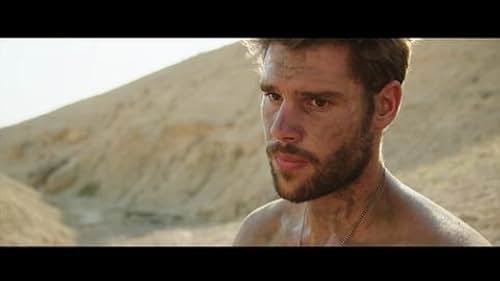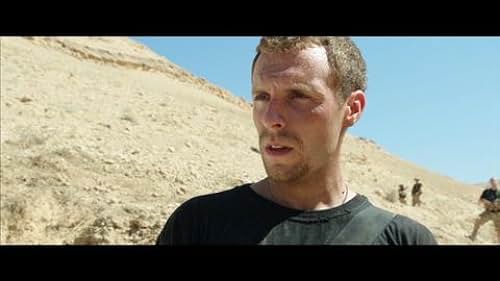Kajaki Dam 2006. A company of young British soldiers encounter an unexpected, terrifying enemy. A dried-out river bed, and under every step the possibility of an anti-personnel mine. A mine ... Read allKajaki Dam 2006. A company of young British soldiers encounter an unexpected, terrifying enemy. A dried-out river bed, and under every step the possibility of an anti-personnel mine. A mine that could cost you your leg - or your life.Kajaki Dam 2006. A company of young British soldiers encounter an unexpected, terrifying enemy. A dried-out river bed, and under every step the possibility of an anti-personnel mine. A mine that could cost you your leg - or your life.
- Nominated for 1 BAFTA Award
- 4 wins & 7 nominations total
Hazem Alagha
- Bomb Head
- (as Hazem Al-agha)
Storyline
Did you know
- TriviaAt the film's first test screening, director Paul Katis was initially depressed as the audience traipsed out without saying a word. He thought that they didn't like the film, when in fact they were traumatized by what they had just seen.
- GoofsWhen the initial patrol approach the minefield, an SA80 rifle is seen with both the SUSAT sight fitted and the Iron Sights Fore Sight also fitted. This is incorrect, if the rifle has a SUSAT sight, the Iron Sight Fore Sight is always removed.
- QuotesAll entries contain spoilers
- Crazy creditsAfter the song is heard in the credits, the soundtrack changes to a recording of radio communications of an action in Afghanistan.
- ConnectionsFeatured in The EE British Academy Film Awards (2015)
- SoundtracksAll Of My Life
Written and Performed by Phoebe Katis
Arranged by Anthony Leung and Phoebe Katis
Recorded at The Crypt Studios
Produced by Anthony Leung and Ricky Barber
Featured review
Like most people with military experience I find conventional war films a bit irritating – Implausible plot lines and ridiculous dialogue along with inaccurate uniforms and weapons tend to detract from the overall impression. The recently released movie Kajaki – the true story is, in the exception to this trend, and an important contribution to the national mood of reflection on the Afghan conflict.
Every aspect of the film is grittily authentic, right down to the banter between the blokes, the detail on the T shirts and the tattoos.
The incident will be familiar to many – in 2006 a patrol from 3 Para stationed at the Kajaki dam wander inadvertently into a legacy minefield from the soviet era with the inevitable unpleasant consequences. What sets this film apart from the crowd is the complete lack of sanitised pastiche violence and a storyline that sticks as closely as possible to the known facts, having had access and co-operation from the surviving members of the patrol, if not from the MOD itself. The movie scrupulously avoids being drawn into discussions about the controversies of the Afghan campaign and the level of resources supplied to the deployed forces, preferring instead to focus completely on the individual soldiers and the events of the day.
As a surgeon with extensive experience of landmine injuries, I was hugely impressed with the level of detail in the depiction and treatment of the injuries and the completely unsentimental depiction of the actions that day. Writing in the Sun, Jeremy Clarkson explained that even though he had taken an interest in the Afghan conflict and had been out to see soldiers on deployment, he had absolutely no idea what the reality of battle and injury entailed until he saw the film. I am certain that many civilians and even some serving servicemen will feel the same after seeing the Kajaki movie.
Having been released at the same time as the annual ceremonies of remembrance and, co-incidentally, at the same time as the centenary of the First world war and the draw-down from Afghanistan, it is important to remind the UK population that war is not all about artistic installations at the Tower of London, beautiful though those may be. With the Army having the lowest headcount in over a century, the population it serves is more disconnected than ever from the military – Kajaki conveniently reminds everyone about the realities of conflict.
Dan Jarvis MP, himself a former Parachute Regiment officer brought up this very point at Defence Questions in the House of Commons and secured an assurance from the Defence Secretary that he would see the film in person. It should be required viewing for a far wider audience.
Every aspect of the film is grittily authentic, right down to the banter between the blokes, the detail on the T shirts and the tattoos.
The incident will be familiar to many – in 2006 a patrol from 3 Para stationed at the Kajaki dam wander inadvertently into a legacy minefield from the soviet era with the inevitable unpleasant consequences. What sets this film apart from the crowd is the complete lack of sanitised pastiche violence and a storyline that sticks as closely as possible to the known facts, having had access and co-operation from the surviving members of the patrol, if not from the MOD itself. The movie scrupulously avoids being drawn into discussions about the controversies of the Afghan campaign and the level of resources supplied to the deployed forces, preferring instead to focus completely on the individual soldiers and the events of the day.
As a surgeon with extensive experience of landmine injuries, I was hugely impressed with the level of detail in the depiction and treatment of the injuries and the completely unsentimental depiction of the actions that day. Writing in the Sun, Jeremy Clarkson explained that even though he had taken an interest in the Afghan conflict and had been out to see soldiers on deployment, he had absolutely no idea what the reality of battle and injury entailed until he saw the film. I am certain that many civilians and even some serving servicemen will feel the same after seeing the Kajaki movie.
Having been released at the same time as the annual ceremonies of remembrance and, co-incidentally, at the same time as the centenary of the First world war and the draw-down from Afghanistan, it is important to remind the UK population that war is not all about artistic installations at the Tower of London, beautiful though those may be. With the Army having the lowest headcount in over a century, the population it serves is more disconnected than ever from the military – Kajaki conveniently reminds everyone about the realities of conflict.
Dan Jarvis MP, himself a former Parachute Regiment officer brought up this very point at Defence Questions in the House of Commons and secured an assurance from the Defence Secretary that he would see the film in person. It should be required viewing for a far wider audience.
- eddie-chaloner
- Dec 6, 2014
- Permalink
- How long is Kilo Two Bravo?Powered by Alexa
Details
Box office
- Gross US & Canada
- $7,891
- Gross worldwide
- $34,017
- Runtime1 hour 48 minutes
- Color
- Aspect ratio
- 2.35 : 1
Contribute to this page
Suggest an edit or add missing content




















